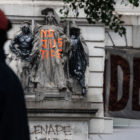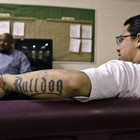
NYPD Won’t Stay in Schools Under New Budget Agreement
|
NEW YORK — The Surrogate's Court in Lower Manhattan received a fresh coat of paint — albeit an unprompted one, after graffiti, as colorful in its language as it was in its incandescence, was scrawled across the building by anti-police protesters. Nearby, an elevator shaft for the City Hall 4/5/6 train was covered in scraps of cardboard etched with messages memorializing the lives of Black Americans killed by police. Demonstrators had encamped in the area around City Hall for days while inside city officials dealt with one of the most significant political issues of their time — how to effect massive reforms to the nation's largest police department without sacrificing public safety. The solution from city leaders, much to the consternation of some protesters who envisioned a wholesale removal of police altogether, has been to enact a massive shift in funding away from the New York Police Department (NYPD), to the tune of nearly $1 billion, and reinvest it into communities of color. After midnight this morning the City Council voted on a budget that includes deep cuts to NYPD personnel and shifts millions to other city agencies.








